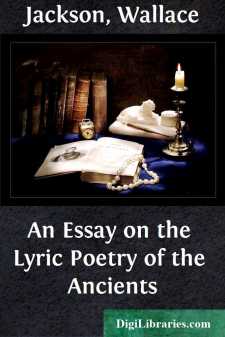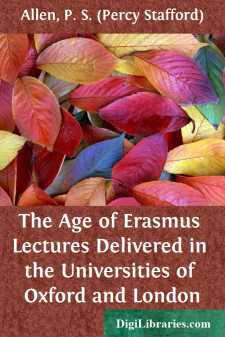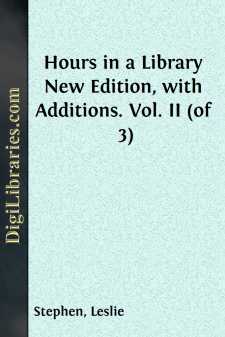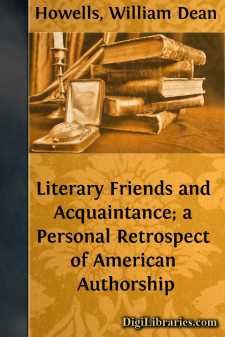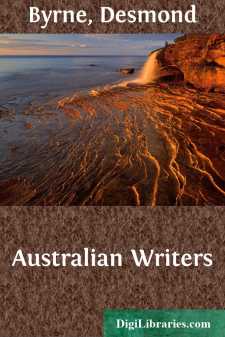Literary Criticism
- American 18
- Ancient and Classical 3
- Asian 1
- Australian & Oceanian 1
- Books & Reading 8
- Caribbean & Latin American 2
- Drama 2
- English, Irish, Scottish, Welsh 49
- European 7
- General 37
- Horror 1
- Humor 2
- Jewish 2
- Medieval 2
- Middle Eastern 3
- Poetry 7
- Renaissance 6
- Russian & Former Soviet Union 1
- Shakespeare 27
Literary Criticism Books
Sort by:
by:
Wallace Jackson
INTRODUCTION John Ogilvie (1733-1813), Presbyterian divine and author, was one of a group of Scottish literary clergy and a fellow of the Edinburgh Royal Society. Chambers and Thomson print the following generous estimation of his work:Of all his books, there is not one which, as a whole, can be expected to please the general reader. Noble sentiments, brilliant conceptions, and poetic graces, may be...
more...
I THE ADWERT ACADEMY The importance of biography for the study of history can hardly be overrated. In a sense it is true that history should be like the law and 'care not about very small things'; concerning itself not so much with individual personality as with fundamental causes affecting the rise and fall of nations or the development of mental outlook from one age to another. But even if...
more...
by:
Leslie Stephen
A book appeared not long ago of which it was the professed object to give to the modern generation of lazy readers the pith of Boswell's immortal biography. I shall, for sufficient reasons, refrain from discussing the merits of the performance. One remark, indeed, may be made in passing. The circle of readers to whom such a book is welcome must, of necessity, be limited. To the true lovers of...
more...
CHAPTER I.INTRODUCTORY. Village libraries—Difficulties of travel—Literary Societies in the Highlands—Gaelic books—Happiness and geniality of natives—Oban to Gairloch—Winter sailing—A crofting village—Horrors of the Minch—Notes on Lewis—Highland doctors—Hotels and anglers—Recent books—Military—Moray Firth—Among the miners—Handloom weaving—Professor Blackie and the...
more...
by:
John Palmer
I There is a tale of Mr Kipling which relates how Eustace Cleever, a celebrated novelist, came to the rooms of a young subaltern and his companions who were giving an account of themselves. Eustace Cleever was a literary man, and was greatly impressed when he learned that one of the company, who was under twenty-five and was called the Infant, had killed people somewhere in Burma. He was suddenly...
more...
§ 1. THE MAIN (SENTIMENTAL) PLOT OF THE FOUR LOVERS AND THE COURT OF THESEUS "And out of olde bokes, in good feith, Cometh al this newe science that men lere." Chaucer. As the play opens with speeches of Theseus and Hippolyta, it is convenient to treat first of these two characters. Mr. E.K. Chambers has collected (in Appendix D to his edition) nine passages from North's Plutarch's...
more...
Long before I began the papers which make up this volume, I had meant to write of literary history in New England as I had known it in the lives of its great exemplars during the twenty-five years I lived near them. In fact, I had meant to do this from the time I came among them; but I let the days in which I almost constantly saw them go by without record save such as I carried in a memory retentive,...
more...
by:
Desmond Byrne
Any survey of the work done by Australian authors suggests a question as to what length of time ought to be allowed for the development of distinctive national characteristics in the literature of a young country self-governing to the extent of being a republic in all but name, isolated in position, highly civilised, enjoying all the modern luxuries available to the English-speaking race in older...
more...
PREFACE What I aim at in this book is little more than to give complete reflection to those great figures in Literature which have so long obsessed me. This poor reflection of them passes, as they pass, image by image, eidolon by eidolon, in the flowing stream of my own consciousness. Most books of critical essays take upon themselves, in unpardonable effrontery, to weigh and judge, from their own...
more...
CHAPTER I. THE COLONIAL PERIOD. 1607-1765. The writings of our colonial era have a much greater importance as history than as literature. It would be unfair to judge of the intellectual vigor of the English colonists in America by the books that they wrote; those "stern men with empires in their brains" had more pressing work to do than the making of books. The first settlers, indeed, were...
more...


